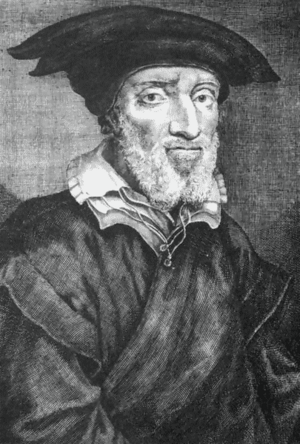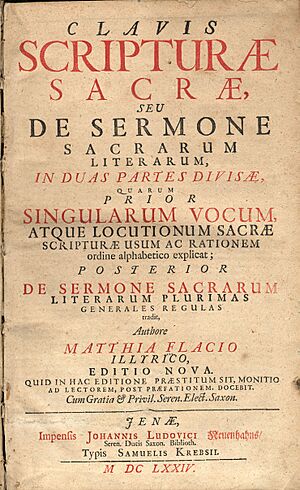Matthias Flacius facts for kids
Quick facts for kids
Matthias Flacius
|
|
|---|---|

Matthias Flacius Illyricus
|
|
| Born |
Matthias Vlacich or Francovich
3 March 1520 Labin, Venetian Republic
(modern Croatia) |
| Died | 11 March 1575 (aged 55) |
| Other names | Matija Vlačić Ilirik (Franković) |
| Occupation | Theologian, church historian, philosopher |
| Years active | 1544–1575 |
Matthias Flacius Illyricus (born Matija Vlačić Ilirik or Francovich) was an important Lutheran reformer. He lived from 1520 to 1575. He came from a region called Istria, which is now part of Croatia.
Flacius was known as a theologian, which is someone who studies religion. He sometimes disagreed strongly with other Lutherans. He was also a respected scholar who helped create a big history book called the Magdeburg Centuries.
Contents
About Matthias Flacius
His Early Life and Studies
Matthias Flacius was born in Labin, a town in Istria. His father, Andrea Vlacich, was a small landowner who died when Matthias was young. His mother, Jacobea Luciani, came from a well-known family in Labin.
When he was 16, Flacius went to study in Venice. There, he learned from a famous teacher named Giambattista Cipelli. At 17, he thought about becoming a monk. However, his uncle-in-law, Baldo Lupetina, convinced him to go to university instead. Baldo was a Franciscan friar who supported the Protestant Reformation.
Flacius continued his studies in Basel in 1539. He then went to Tübingen and finally to Wittenberg in 1541. In Wittenberg, he was welcomed by Philip Melanchthon, a key figure in the Reformation. He was also influenced by Martin Luther. In 1544, Flacius became a professor of Hebrew at Wittenberg. He earned his master's degree in 1546, graduating at the top of his class.
His Work and Beliefs
Flacius quickly became important in the religious discussions of his time. He strongly disagreed with certain compromises made by other Lutherans, especially the Augsburg Interim and the Leipzig Interim. Philip Melanchthon, who had once welcomed him, later called him a "snake."
In 1549, Flacius moved to Magdeburg. In 1557, he became a professor at the theological faculty in Jena. However, he soon had arguments with a colleague about how much humans can choose to do good.
Flacius believed that humans are naturally unable to do good on their own. He thought that original sin had completely changed human nature. He believed that humans were almost entirely filled with evil after the The Fall of Man. This meant they could not even help themselves to accept the Gospel without God's help. He taught that human acts of piety (religious devotion) were worthless by themselves. Humans depended entirely on God's grace for salvation. Those who agreed with him were called Flacians.
Because of his strong views, Flacius left Jena in 1561. He tried to start an academy in Regensburg, but it was not successful. In 1566, he moved to Antwerp, but war forced him to leave. He then went to Frankfurt and later to Strasbourg. In Strasbourg, his religious views again caused arguments. The authorities told him to leave the city by May 1573.
A prioress named Catharina von Meerfeld secretly helped Flacius and his family in Frankfurt. He became ill there and died on March 11, 1575.
His Impact and Legacy
Matthias Flacius lived during a very busy and changing time. He helped start the scientific study of church history in a modern way. He also contributed to hermeneutics, which is the study of how to interpret texts, especially religious ones. His main goal was to show what he believed were the false ideas of Roman Catholicism.
His famous saying, historia est fundamentum doctrinae (history is the foundation of doctrine), means that understanding history is key to understanding religious beliefs.
Some people, like Emil Petru Rațiu, believe that Flacius might have been of Istro-Romanian background. This idea comes from the presence of Istro-Romanians in Labin during his time. It also comes from his father's surname, "Vlacich," which might be linked to "Vlach."
His Family Life
In 1545, while in Wittenberg, Flacius married a pastor's daughter. They had twelve children together before she passed away in 1564. He remarried the same year in Regensburg and had six more children with his second wife. His son, Matthias Flacius Junior, later became a professor at Rostock.
His Writings
- De vocabulo fidei (1549)
- De voce et re fidei (1555)
- Antilogia Papae (1555)
- Catalogus testium veritatis, qui ante nostram aetatem reclamarunt Papae (1556)
- Confessio Waldensium (1568)
- Konfutationsbuch (1559)
- Ecclesiastica historia, integram Ecclesiae Christi ideam ... secundum singulas Centurias, perspicuo ordine complectens ... ex vetustissimis historicis ...congesta: Per aliquot studiosos et pios viros in urbe Magdeburgica (1559–1574)
- Clavis Scripturae Sacrae seu de Sermone Sacrarum literarum (1567)
- Glossa compendiaria in Novum Testamentum (1570)
See also
 In Spanish: Flacio Illirico para niños
In Spanish: Flacio Illirico para niños
 | Tommie Smith |
 | Simone Manuel |
 | Shani Davis |
 | Simone Biles |
 | Alice Coachman |


